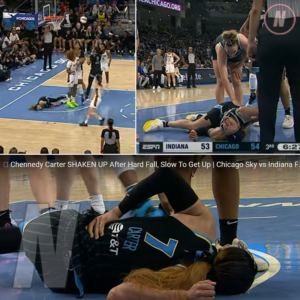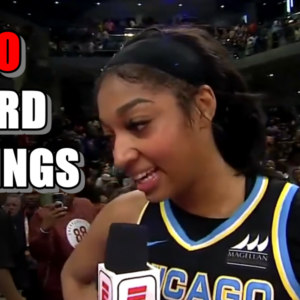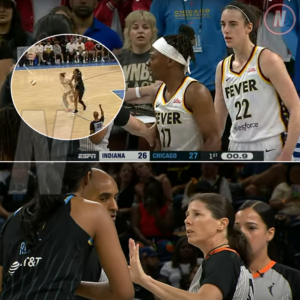
Caitlin Clark. Photo: Getty Images
Caitlin Clark was stunned.
Clark’s Indiana Fever were playing the Chicago Sky, and Sky guard Chennedy Carter had just knocked down a midrange jumpshot. Afterwards, Carter marched straight up to Clark, yelled, and laid her shoulder into her, sending Clark flying.
Carter refused to answer any questions after the game about why she did what she did (or questions about Clark at all, for that matter). But in a post on social media platform “X,” Carter referenced what happened on the previous play, in which Clark slapped the ball away from Carter and then appeared to yell at her afterward.
Clark, on the other hand, did address the play.
“I wasn’t expecting that,” Clark said after the game. “But I think it’s just like, ‘Respond, calm down, and let your play do the talking.'”
Respond, calm down, and let your play do the talking.
That’s exactly what Clark did. Following the foul, she was able to sink the corresponding free throw. And that one point ended up being exactly what the Fever needed to defeat the Sky, 71-70.
Clark’s 10-word reply is more than a great sound bite; it’s a mini master class in emotional intelligence, the ability to understand and manage emotions.
What are the key takeaways from Clark’s reply? And how can you apply these lessons to your own work life? To answser those questions, let’s take a look at what happens inside the brain in a moment like this, and what you can do to manage that response. (By the way, if you find value in this article, you might be interested in my free emotional intelligence course, which delivers a new rule directly to your inbox every day for a week.)
How to hack an emotional hijack
To see why Clark’s response is emotionally intelligent, let’s take a look at what’s happening under the hood in an emotional moment like this one.
When you feel under attack, a small part of the brain called the amygdala kicks into overdrive. The amygdala is what scientists call the emotional processor. It detects threats on an unconscious level, and influences how you respond, whether causing you to fight, flee, or freeze.
This is referred to as an emotional hijack. Emotional hijacks aren’t always bad, but they often lead you to say or do something you later regret.
For example, if Clark had fought back, or if she had berated the officials, it could have led to a technical foul on her part–negating the one point the Fever needed for a win. Or, if Clark got caught up in negative emotion, it could have caused her to play poorly for the rest of the game.
Instead, Clark focused on letting her play do the talking. This could be an example of what is known in psychology as positive self-talk.”
Positive self-talk is the process of conducting a dialogue with yourself. It could involve actually speaking to yourself out loud, or it could be a dialogue you have internally, with your thoughts.
Decades of academic research have documented the potential benefits of self-talk, which allows you to engage parts of your brain other than the amygdala, areas like the frontal lobe, which is responsible for high-level cognitive functions such as reasoning and strategizing. In other words, you hack the hijack.
Clark’s postgame quote indicates that she used a form of positive self-talk that reflected three beneficial elements:
1. She was intent on responding, but not in a way that would damage her team’s chances of winning the game.
2. She told herself to calm down, reminding herself that poise in this moment would be more advantageous than lashing out.
3. She channeled her emotional response into her play.
This last step is in harmony with a psychological principle known as the Yerkes-Dodson law, which says that a certain amount of stress or anxiety (arousal, in scientific terms) can improve performance. The key is not to eliminate the stress from an action like this, but to use it to your advantage.
I immediately recognized Clark’s response, because I’ve witnessed something similar firsthand.
For years, I played in an amateur basketball league. My friend Brandon was more than our team’s best player–he was the best I’ve ever played with. Usually, he seemed to be on another level than everyone else on the court.
Brandon was an especially nice guy, and that led to friendships with many opposing players. But despite those friendships, once in a while an opponent would get frustrated with his inablity to guard Brandon and foul him hard.
When that happened, Brandon wouldn’t foul back. He wouldn’t get into any verbal fights. In fact, he barely said anything at all. Instead, he’d get this look. He’d smile, tilt his head to the side, and say something quietly under his breath, like:
“Ah, it’s like that? OK, OK …”
Then, Brandon would channel all that emotional energy and elevate his game even further. He’d score, get steals, block shots, all of the above. He became a one-man wrecking crew.
And he did it all with a big smile on his face. After the game, there was no love lost: Brandon would be the first to go shake his opponent’s hand.
He let his play do the talking.
So, how can you use positive self-talk to your advantage? The next time you feel under attack, remind yourself:
Respond, calm down, and let your play do the talking.
In doing so, you’ll hack the emotional hijack, demonstrate your emotional intelligence–and make emotions work for you, instead of against you.





